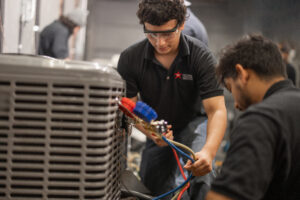Medical assistants (MAs) are indispensable members of the healthcare industry. They accomplish a wide range of crucial tasks that contribute to delivering accessible, efficient, and high-quality healthcare. The adaptability, versatility, and patient-centric approach of medical assistants enable them to bridge the gap between administrative functions and patient care to enhance overall healthcare efficiency.
Today, a demand for allied health professionals and preventive medicine has led to palpable changes in MA roles. This article looks at factors influencing these evolutions. It also examines the impact of the evolving role of medical assistants in healthcare delivery and sheds light on various challenges and future career opportunities for MAs.
Factors Influencing the Evolving Role of Medical Assistants
Medical assistants are fulfilling a vital function in assisting physicians and other healthcare professionals in delivering comprehensive patient care. The expanding workload in the primary care settings has created new opportunities for MAs to take on more responsibilities.
The healthcare industry has also witnessed a fundamental shift toward patient-centered care, focusing on personalized treatment plans and improved patient outcomes. MAs contribute to this endeavor with their direct patient interactions by ensuring a seamless, compassionate patient experience and fostering patient-doctor trust.
The integration of technology and electronic health records (EHRs) has also contributed to revolutionizing healthcare delivery. MAs today play a vital role in managing and updating EHRs to ensure accurate and accessible patient information, streamline administrative tasks, and facilitate open communication within the healthcare team.
As a result, medical assistant training and education programs in Texas have risen to the occasion to meet the changing demands of the healthcare sector. These programs equip aspiring MAs with the necessary skills and knowledge to excel in their roles. Training includes everything from clinical procedures to administrative tasks and effective communication aimed at empowering learners to become valuable members of any healthcare team.
How Does the Changing Role of Medical Assistants Impact Healthcare Delivery?
With the support of medical assistants, physicians can expand their reach and offer timely care to quite a larger number of patients. MAs simplify patient flow, optimize appointment scheduling, and ensure efficient care coordination, leading to enhanced patient access and improved continuity of care.
MAs are integral to the smooth operation of healthcare settings. Their diverse skill sets and multitasking abilities enable them to handle numerous tasks.
By relieving the pressure of non-medical responsibilities off doctors’ shoulders, MAs contribute to increased work efficiency.
This, in turn, allows teams to focus on providing high-quality, timely patient care. They also contribute to cost savings in healthcare organizations through their ability to manage administrative responsibilities. Their roles include helping minimize the need for additional personnel and related costs.
Effective communication, teamwork, and support among interdisciplinary teams represent joint efforts among healthcare professionals to manage critical tasks and obligations effectively. Medical assistants serve as a bridge between doctors, patients, and other allied health professionals. They enhance care coordination and ensure a comprehensive, holistic patient treatment by facilitating interprofessional collaboration.
Dealing With the Changing Role of Medical Assistants
As the responsibilities of medical assistants expand, it is necessary to establish clear guidelines regarding their scope of practice to ensure patient safety and legal compliance. Striking a balance between delegations and maintaining professional boundaries is important for healthcare facilities and medical assistants alike.
Training is crucial because the demand for well-trained medical assistants is growing— and maintaining high professional development standards becomes imperative. Adherence to evolving best practices is also vital for MAs, who must keep pace with the changing healthcare landscape and provide quality care to patients.
Collaboration among healthcare professionals enables effective patient care. Medical assistants must hone their communication skills to foster positive working relationships with other team members. This interdisciplinary collaboration ensures seamless coordination and a patient-centric approach to healthcare.
Maintaining patient safety and quality of care cannot be overstated enough. MAs should comply with various protocols. They must also accurately document patient information and continuously refine their skills to provide the highest level of patient care.
What the Future Holds for Medical Assistants
Integrating telehealth and virtual care services presents new opportunities for medical assistants. MAs can now support healthcare providers in delivering care remotely, managing virtual appointments, and assisting with telemedicine technology, thereby expanding access to healthcare services.
Allied health students can also pursue training and acquire certification in specialized areas of healthcare. Enhancing their knowledge and skills in several fields can open doors to new career options and responsibilities. With experience and additional education, MAs can progress into leadership and management positions within the healthcare industry. They may oversee teams of medical assistants, coordinate workflows, and even contribute to strategic decision-making, further advancing their careers. Not too long ago, the world witnessed the fastest vaccine development for the complex COVID-19 virus. This shone a bright light on the medical research field. MAs who want to pursue this line of work can contribute to data collection, actively participate in clinical trials, and collaborate with researchers to develop and implement new treatment protocols.
Invest in a Rewarding Medical Assistant Career
The role of medical assistants in healthcare settings has evolved over the years, and their involvement makes invaluable contributions to patient care. Recognizing the factors influencing these changes, understanding their impact on healthcare delivery, and addressing the associated challenges will ensure the continued success of professional medical assistants in Texas.
Southern Career Institute offers a comprehensive Medical Assistant program aimed at training candidates on the skills and knowledge needed to excel in their chosen fields. Contact us today to request more information about the Medical Assistant program offered at SCI and embark on a successful healthcare career.











